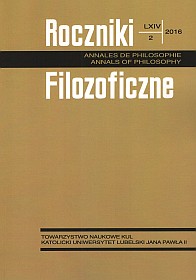Próba ujęcia języka metafizyki w świetle pracy Język i świat realny Mieczysława Alberta Krąpca
Abstrakt
Istnieje potrzeba, żeby język był odpowiednim narzędziem do przekazywania całego bogactwa naszych myśli. Do wyższych aktywności rozumu ludzkiego zalicza się myślenie abstrakcyjne, które jest użyteczne w dziedzinie metafizyki. Rozważania dotyczące języka jako adekwatnego narzędzia komunikacji metafizyki – doniosłej wiedzy o świecie realnym – stały się przedmiotem pracy Mieczysława Alberta Krąpca Język i świat realny. Po analizie wspomnianej pracy Krąpca można dojść do wniosku, że język naturalny wymaga określonych uściśleń, by być narzędziem komunikacji odpowiadającym metafizyce. W ramach języka naturalnego należałoby wyodrębnić pewien uściślony język. Wyodrębnienie go wymagałoby opisu jego słownika i określenia reguł poprawnego składania wyrażeń. W świetle przeprowadzonych analiz okazało się, że słownikiem omawianego tu języka byłby zbiór nazw. Reguły składni wspomnianego języka powinny z kolei być oparte na pewnej relacji określonej na zbiorze nazw. Relacją, która nadawałaby się do sformułowania wspomnianych reguł, jest znana językoznawcom relacja hiponimii.
Bibliografia
Ajdukiewicz, Kazimierz. Logika Pragmatyczna. Warszawa: PWN, 1974.
Arystoteles, Metafizyka (tekst grec.-łac.-pol.), tłum. Tadeusz Żeleźnik, red. Andrzej Maryniarczyk, t. 1–2. Lublin: Towarzystwo Naukowe KUL, 1996.
Borkowski, Ludwik. Wprowadzenie do logiki i teorii mnogości. Lublin: Towarzystwo Naukowe KUL, 1991,
Bremer, Józef W. Wprowadzenie do logiki. Kraków: WAM, 2008.
Gensler, Harry. Introduction to Logic. New York: Routledge, 2010.
Gilson, Étienne. Elementy filozofii chrześcijańskiej, tłum. Tomasz Górski, Warszawa: PAX, 1965.
Hajduk, Zygmunt. Ogólna metodologia nauk. Lublin: Wydawnictwo KUL, 2007.
Kowalczyk, Stanisław. Zarys filozofii człowieka. Sandomierz: Wydawnictwo Diecezjalne, 2002.
Krąpiec, Mieczysław Albert. Ja – człowiek. Lublin: Wydawnictwo KUL, 2005.
Krąpiec, Mieczysław Albert. Język i świat realny. Lublin: Redakcja Wydawnictw KUL, 1985.
Krąpiec, Mieczysław Albert. „Transcendentalia i uniwersalia”, Roczniki Filozoficzne 9 (1961), 1: 55–70.
Kwiatkowski, Tadeusz. Wykłady i szkice z logiki ogólnej. Lublin: Wydawnictwo UMCS, 2008.
Maryniarczyk, Andrzej. Zeszyty z metafizyki, t. 1-5. Lublin: PTTA, 2001–2006.
Piechowicz, Robert. Logika, topologia, język. Relacja bliskości znaczeń na poziomie leksyki. Tarnów: OBI, Biblos, 2007.
Pogonowski, Jerzy. Hiponimia. Poznań: Wydawnictwo Naukowe UAM, 1991.
Regner, Leopold. Logika. Kraków: PTT, 1973.
Rorty, Richard. Przygodność, ironia i solidarność, tłum. Wacław Jan Popowski. Warszawa: Wydawnictwo W.A.B., 2008.
Świrydowicz, Kazimierz. Podstawy logiki modalnej. Poznań: Wydawnictwo Naukowe UAM, 2004.
Tokarz, Marek. Elementy pragmatyki logicznej. Warszawa: PWN, 1993.
Tomasz z Akwinu, św. Suma teologiczna, t. 1–34, tłum. Feliks Bednarski, Pius Bełch, Andrzej Głażewski. Londyn: Veritas, 1962–1986.
Tomasz z Akwinu, św. Quaestiones disputatae De veritate. Dysputy problemowe O prawdzie (tekst łac.-pol.), tłum. A. Białek, red. Andrzej Maryniarczyk. Lublin: Redakcja Wydawnictw KUL, 1999.
Tomasz z Akwinu, św. De ente et essentia, O bycie i istocie (tekst łac.-pol.), tłum. Mieczysław A. Krąpiec, w: Mieczysław Albert Krąpiec. Byt i istota. Św. Tomasza „De ente et essentia”. Przekład i komentarz, 7–47. Lublin: Redakcja Wydawnictw KUL, 1994.
Ziembiński, Zygmunt. Logika praktyczna. Warszawa: Wydawnictwo Naukowe PWN, 2016.
Copyright (c) 2016 Roczniki Filozoficzne

Utwór dostępny jest na licencji Creative Commons Uznanie autorstwa – Użycie niekomercyjne – Bez utworów zależnych 4.0 Międzynarodowe.





